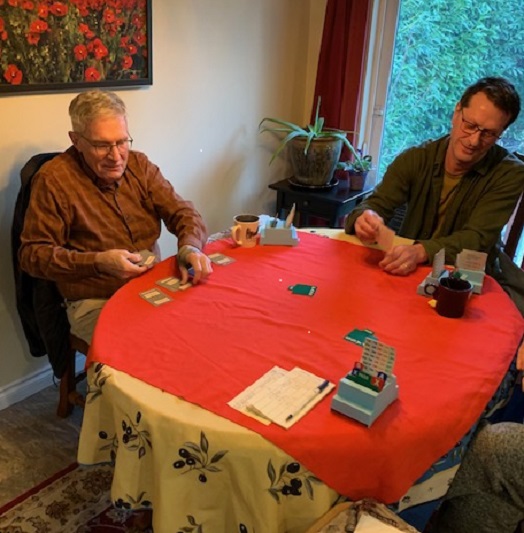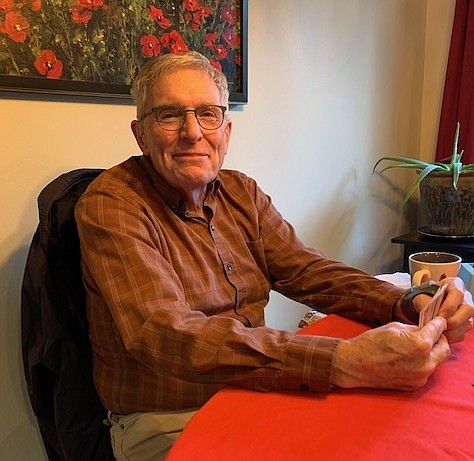Combating Loneliness
February 14, 2023 at 12:29 p.m.
Due to the COVID pandemic, many older adults are more isolated than ever. However, adopting a new view of your life, can go a long way in eliminating that problem. David Bird, who is 71 years old, retired 4 years ago from his clinical practice of psychotherapy. As a licensed independent clinical social worker, his work was very “people intensive” and intimate. So, when he retired he had a lot to replace in terms of people contact.
“A reassessment of my needs for personal time and people time was in order. One might think of an introversion and extroversion rebalancing. We can enjoy both sides of ourselves as we go into this new life planning,” said Bird. In general, adults gain energy and recharge ourselves either with alone time or with social activities and people. For many people, it’s both. Bird said all older adults should identify their own methods for self-care.
Many people have internal and external triggers for lonely feelings. Bird said it is important to identify them and make some efforts to cope with the lonely feelings that naturally arise in life. “Awareness of those triggers is a useful first step to feeling some power to feel better,” said Bird. “I golf, exercise, call and see friends and family. I play bridge twice a week, which is always enlivening and engaging.”
One of the best ways to combat loneliness is to stay in contact with others and have a large social circle, which can be difficult for many older adults. “We need to craft a new relationship with ourselves too. We have a lot more time to keep ourselves company, and we can do this in ways that bring us feelings of pleasure and comfort,” said Bird.
Volunteering Protects from Loneliness
Volunteering or looking after grandchildren may help reduce loneliness, according to data from 28 studies, comprising of 191,652 participants from 21 countries. Writing in the journal Aging and Mental Health, a team of international experts led by scientists at King's College London, state that older adults should develop targeted interventions to combat loneliness.
"Loneliness can leave people feeling isolated and disconnected from others, and can have a wide range of negative effects on their physical and mental health," said lead author, Samia Akhter-Khan, who is with the Institute of Psychiatry, Psychology & Neuroscience within King's College London.
This new systematic review, included 28 studies from countries including the United States, Germany, the United Kingdom, New Zealand, China and many others. The authors examined the relationship between specific types of unpaid activities, including caring for a spouse, looking after grandchildren or volunteering, and loneliness in adults over 50. They found caring for grandchildren (or other unrelated children) was linked with lower loneliness in six out of seven studies.
Providing care to a partner or spouse was consistently associated with higher loneliness. Five out of six studies reported a relationship between volunteering and lower levels of loneliness. "This is the first review of its kind to investigate systematically the relationship between older people's caregiving and volunteering activities and loneliness," said study co-author Dr. Matthew Prina, who is Head of the Social Epidemiology Research Group at King's College London.
Bird has worked at a food bank in Seattle for many years and he said it has been richly rewarding in ways he ever thought possible. “Volunteering my time at a local food bank allows me to give to others. I can stay connected to people and dissolve feelings of isolation and loneliness. Developing and using our compassion and empathy unites us with our fellow humans. That connection certainly lessens existential and personal loneliness,” said Bird.
 David Bird in action at his regular bridge game
David Bird in action at his regular bridge game
Social Isolation versus Loneliness
Social isolation is defined as having infrequent in-person contact with people for social relationships, such as with family, friends or members of the same community or religious group. Loneliness is when you feel like you are alone or have less connection with others than you desire. Mental health experts note that social isolation and feeling lonely are related, but they are not the same thing. It turns out that an individual can lead a relatively isolated life and not feel lonely, and people with many social contacts may still experience loneliness.
Some experts in this field contend that loneliness results, in part, from a discrepancy between expected and actual social relationships. In every relationship, we expect certain basics. We all want people in our lives who we can ask for help. Friends we can call on when we need them. Someone to talk to. People who "get" us. Someone we can trust. Companions with whom we can share fun experiences. However, what we want from social connections in our 30s may not be what we want in our 70s.
Studies show that older adults want to feel respected. They want people to listen to them, to take an interest in their experiences, and learn from their mistakes. They also want others to appreciate what they've been through and the obstacles they have overcome. Many older adults want to contribute and give back to others and their community. This can be accomplished through teaching, mentoring, volunteering, caregiving, or other meaningful activities.
Even before the COVID-19 pandemic, world leaders began sounding the alarm on loneliness as a public health issue. In 2018, Britain became the first country to name a minister for loneliness and Japan followed suit in 2021. That's because loneliness is more than a feeling. It can have real impacts on health. Persistent loneliness has been associated with higher risks of dementia and Alzheimer's disease, heart disease and stroke, and other health problems. Some researchers suggest it's comparable or riskier than smoking and obesity.
"Being connected to others socially is widely considered a fundamental human need, crucial to both well-being and survival. Extreme examples show infants in custodial care who lack human contact fail to thrive and often die, and indeed, social isolation or solitary confinement has been used as a form of punishment," said Julianne Holt-Lunstad, a professor of psychology at Brigham Young University in Utah. "Yet an increasing portion of the U.S. population now experiences isolation regularly."
Approximately 42.6 million adults over age 45 in the United States are estimated to be suffering from chronic loneliness, according to AARP's Loneliness Study. In addition, the most recent U.S. census data shows more than a quarter of the population lives alone, more than half of the population is unmarried and, since the previous census, marriage rates and the number of children per household have declined.
"These trends suggest that Americans are becoming less socially connected and experiencing more loneliness," said Holt-Lunstad. "With an increasing aging population, the effect on public health is only anticipated to increase. Indeed, many nations around the world now suggest we are facing a ‘loneliness epidemic.’”
John Schieszer is an award-winning national journalist and radio and podcast broadcaster of The Medical Minute. He can be reached at medicalminutes@gmail.com.





